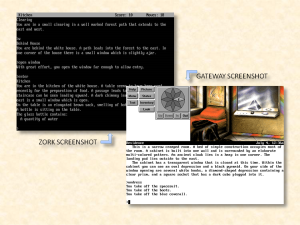I quite like reading. I quite like adventure gaming. So the best of both of those worlds has got to be text adventures, right? Well. Sort of. If the writing is smart and the characters are clever then text adventures can - absolutely - paint marvellous pictures in your mind - the kind graphics engines simply don't have the oomph to render, but the problem with text adventures is that they're sometimes obtuse. The writing can be fantastic and the game world and characters can be completely memorable - both good reasons to start playing text adventures today [because modern text adventures tend to double down on both those things] but...
...the puzzles. Dear God, the puzzles.
And that's why I kind of like the design intent behind Gateway. Gateway sort of understands this problem.

On the surface, Gateway looks like any number of other Legend Entertainment games: it has a polished interface with windows that cleanly and clearly denote each section of the game. Compass on one side, verbs along with the compass so you never get stuck for "what to type" - a small window with hand-drawn graphics that shows you a glimpse of the action and a vast lower half of the screen completely devoted to the - sometimes surprisingly well-written text.
This is in stark contrast with most other text adventures at the time, where - at most - you would get a status line and the whole screen would be subsumed by text. So, already, Gateway is making it easier for new players to appreciate the world of interactive fiction. Instead of guessing at verbs they might need, they simply select them from a list. Instead of wondering which exits the player can possibly take, they're clearly marked on-screen.
So, if you're new to the genre, this particular game certainly seems inviting.
It even has a pretty interesting plot, built upon a book by the same name penned by Frederik Pohl - a grand master of science fiction.
If you've read that book, you will feel perfectly at home in the world that has been created here. A world that's somewhat in the future, but clearly contains traces of the past in which it was written. In this particular version of our future the planet has shot for the stars, aided by technology they found early in their initial exploration. Benevolent [? - it's a little tricky to tell if they are actually benevolent - but that's better left as an exercise to the reader: go play the game and see what you think after] aliens have left behind ancient artefacts that allow us to cross great distances in the blink of an eye. The upside? It becomes far easier to map the galaxy and find treasures. The downside? Well, we're still scouring the skies and we haven't quite cracked the alien language. You could go on to riches as much as you could wind up dying if you take a trip on an alien ship.
This is where you come in. You've won a lottery to participate in being a Gateway Prospector. What that means is that the science guys pick lottery tickets with potential co-ordinates that might have something interesting at them and then, they slingshot you at those places.
The thing is, of course, that everyone is trying to be a Prospector. So the science guys don't actually care if they sling shot you to your doom. So the first half of the game is a trial-by-fire were you're trying to prove your worth as a valuable Prospector Asset. This then leads to the final act, which is not...surprising, exactly but might come a little out of left field if you think the game is a short one where all you need to do is find some big technological payoff.
![If there's one big problem [and it really is a big problem] with text adventures, it's that they're BRUTAL. In this screenshot, there's a monster who's hungry and if you put so much as a foot wrong on his planet without first mapping where and how he walks [like a stealth game], you'll die. And not always with a way to salvage the situation. You'll just walk left and that's it. Death message.](http://twinstiq.com/wp-content/uploads/2016/05/gateway_danger-300x225.png)
But that last third is what makes this game fantastic. There's a planet that is nothing but one large meta-puzzle, an acid-trippy world where - when you fall asleep - aliens try and communicate with you through your dreams - a hilariously quaint Gary Stu character who refuses to die, regardless of the odds against him.
It's also full of puzzles. Some of them are...excessively tricky, but most of them are fairly logical given the situations you're in and the issues you're facing. [Of course, in true text adventure style, there are a handful that are just flat out weird, but...you can't have a design team bat home runs at every turn.]
So sure. It doesn't have amazing graphics [and the music is middling, at best] but I can highly recommend Gateway as your first trip to text-adventure-land. It's easy on the eyes, it has fairly logical puzzles [for the most part, anyway. Definitely take a walk-through] - it doesn't believe in excessive mazes, it weaves an interesting [if formulaic] yarn and is staggeringly long for a text adventure. [my play through ran to about seven or so hours, all-told.]
If you see it, I'd certainly recommend picking it up. You may make some fine alien friends.
I did a let's play of Gateway. You can watch it here.

